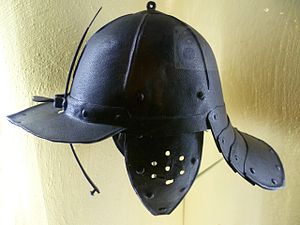Engagers
The Engagers | |
|---|---|
 A Covenanter's helmet from the period in the Museum of Edinburgh | |
| Founded | December 1647 |
| Dissolved | 1651 |
| Split from | Covenanters |
| Ideology | Presbyterianism Royalist |
| International affiliation | none |
The Engagers were a faction of the Scottish Covenanters, who made "The Engagement" with King Charles I in December 1647 while he was imprisoned in Carisbrooke Castle by the English Parliamentarians after his defeat in the First Civil War.
History
The Covenanters, a national Presbyterian movement, governed Scotland from 1639–1651, during the civil Wars of the Three Kingdoms. They supported the English Parliamentarians in the First English Civil War in return for the Long Parliament agreeing to the Solemn League and Covenant, which promised reform in England and support for the Scottish church settlement.
After the Scottish Covenants and their English Parliamentary allies' victory, the English Religious Independents (Congregationalists)—who were strongly represented in the New Model Army both in the rank and file and among the Grandees like Oliver Cromwell—started to eclipse the influence of the Presbyterians in the English Parliament and the New Model Army. While militarily defeated and a prisoner of first the Scots and then the English Parliament, Charles I was still important politically and he negotiated with all parties of his erstwhile enemies seeking to regain his liberty and power. The Scots (who feared the abandonment by the Independents of the Solemn League and Covenant) and their English Presbyterian allies negotiated with Charles, as did the Independents in the New Model Army, who, in June 1647, eventually wrested Charles from English Parliamentary detention and placed him under their direct supervision).[1]
The English Presbyterians and the Scots began to prepare for a second war, less than two years after the conclusion of the first, this time against the "Independency" of the New Model Army.[2] Some of their General Assembly members signed a secret treaty with Charles I in 1647, known as The Engagement, which promised that Charles would support the establishment of Presbyterianism, in England for a period of three years, in return for a military alliance with the Covenanters.[3] Not all Covenanters agreed with The Engagement and a large faction known as the Kirk party, strongly influenced by Archibald Campbell, 1st Marquess of Argyll were opposed, because King Charles refused to take the Covenant personally and they feared he would not honour the agreement if he were restored to power. However the faction that supported The Engagement, known as The Engagers, outmaneuvered the Kirk party, defeating some of them in a skirmish at Mauchline Muir, and organised an expeditionary army. Neither of the more experienced Scottish Generals, Lord Leven or David Leslie, was willing to lead the army (as they sided with Argyll) so the command was given to the less experienced Duke of Hamilton.
The army was sent to England to try to enforce this deal but Cromwell routed it at the battle of Preston in 1648, and Charles I was executed in 1649. This defeat discredited the Engager party. However the Engagers won a victory in the following month at the Battle of Stirling (1648). The more radical Covenanters, in the Kirk party, insisted that any future deal with the King or other would have to include the public endorsement of their demands and not the secret promise of concessions in the future. Charles II agreed to their demands in the Treaty of Breda (1650), but his defeat at the Battle of Worcester 1651 at the hands of Oliver Cromwell negated any agreements he had made with the Covenanters. Later he averred that "Presbyterianism is no religion for a gentleman".
See also
References
This article needs additional citations for verification. (June 2018) |
- ^ Atkinson, Charles Francis (1911). . In Chisholm, Hugh (ed.). . Encyclopædia Britannica. Vol. 12 (11th ed.). Cambridge University Press. p. 418.
{{cite encyclopedia}}: Invalid|ref=harv(help) - ^ Atkinson 1911, p. 418.
- ^ "Gardiner: Constitutional Documents of the Puritan Revolution". Constitution Society. 1 June 1999. Retrieved 27 June 2018.
Notes
External links
- Plant, David (1 November 2008). "The Engagement, 1647-8". BCW Project. Retrieved 27 June 2018.
